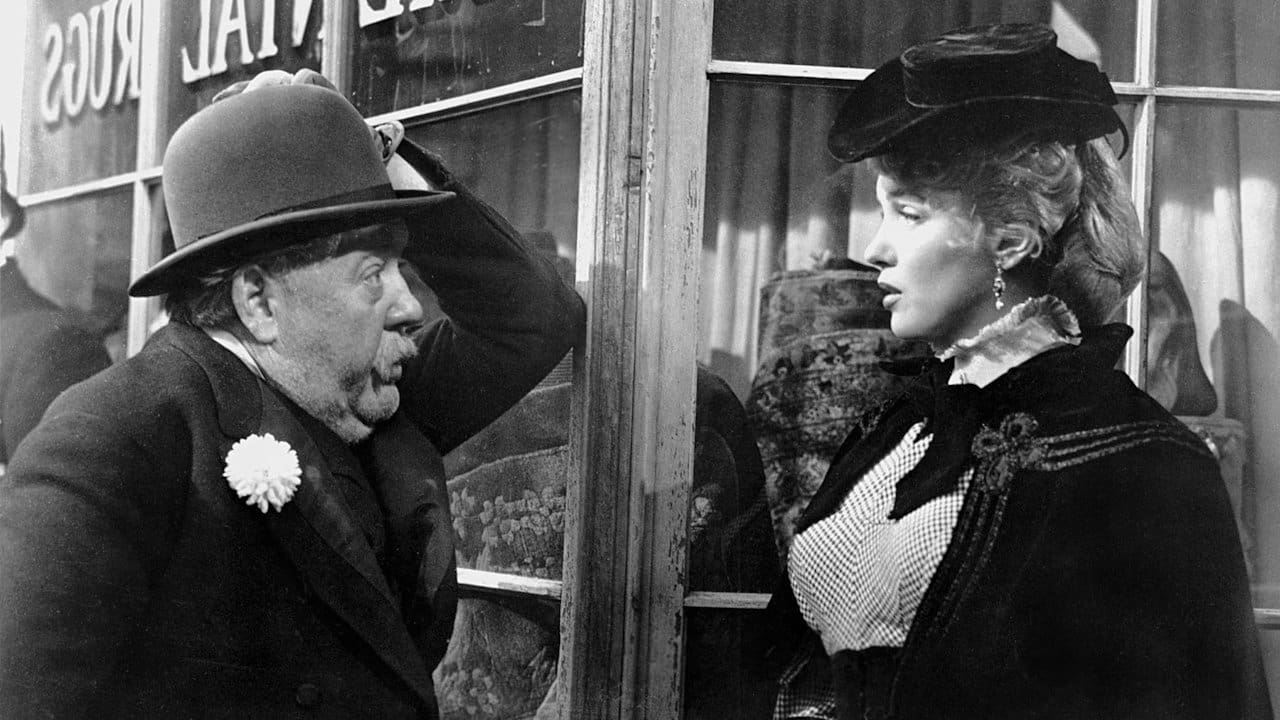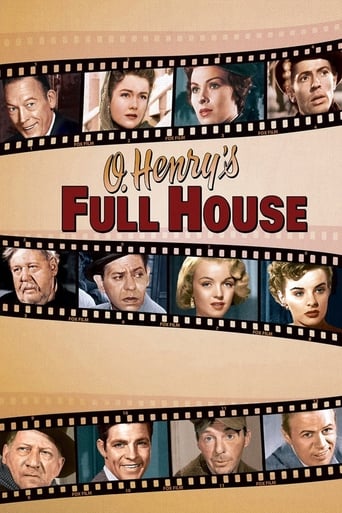

Tied for the best movie I have ever seen
... View MoreSelf-important, over-dramatic, uninspired.
... View MoreIt isn't all that great, actually. Really cheesy and very predicable of how certain scenes are gonna turn play out. However, I guess that's the charm of it all, because I would consider this one of my guilty pleasures.
... View MoreMostly, the movie is committed to the value of a good time.
... View MoreO. Henry was a late 19th and early 20th century short story writer. He was best admired for his twist endings. O. Henry's Full House selected five of his tales to dramatize.As a kid I watched the film on television, sitting on the couch with my beloved dachshund sleeping in my lap. "The Last Leaf" starring Anne Baxter was absorbing my attention. Tossed into a New York City blizzard by her rejecting lover, she despairingly makes her way to her sister's apartment building in front of which she passes out. How curious that in real life, Baxter would decades later collapse on a city sidewalk and die.Baxter is helped inside by her sister and a doctor makes a house call. Diagnosing her with pneumonia, he naively believes that due to her young age she will survive. However, the sister knows about the affair yet cannot convince Baxter to forget it. Lying in bed looking through the picture window, noting the leaves dropping from the vines, she declares that when the last leaf has fallen, she will die.That night the sister and we see two remaining leaves. One blows away and the other is beginning to break off. We all fear the leaf will fall by morning. When dawn comes, there is sunlight behind the curtains, and Baxter demands her sister pull them open. In horrific anticipation, I found myself squirming, startling my poor doggy. To avoid spoiling the scene, I won't reveal what next transpires, but take my word that O. Henry's twists could be quite complex - what you think you see, might not be what really is there.The last movie segment was based on his most popular "The Gift of the Magi", wherein newlyweds experience their first Christmas Eve together. Even in 1905 there was commercialism demanding that people spend rather than focus on their love for each other. We witness the wife in tears as she sells a precious possession to buy a gift for her beloved. When he comes home he is shocked at what she sold. Then she and we experience shock discovering what he in fact sold to afford his present. Fortunately the pair laugh at what they've done, celebrating the true meaning of the season.They've learned the priceless lesson that this feature reminds us of - count your blessings.
... View MoreEach segment is well done, but most are quite predictable, even if expertly produced and performed. The Ransom of Red Chief is the exception. It still seems fresh and original. Both Allen and Levant are good, as is the kid. Hawks's direction is eminently assured. The general predictability of the stories as a whole, though, is probably unavoidable, as it emanates directly from the source, O. Henry's tales. O. Henry is strictly minor league stuff and has not worn well. But, still, they are professional executed and well-done for the most part.Only Red Chief seems inspired, however.
... View MoreThe Fox DVD release of their 1952 "O. Henry' Full House" is a gem in every way. Not only do we get a beautifully restored rendition of five of O. Henry's finest short stories, but we also get a wonderful set of special features that enrich our appreciation and understanding of the author. It starts with the enclosed insert that gives some fascinating information on one of America's pure-eminent storytellers. This insert is very well written and tells a great deal about William Sidney Porter, who took up the pen name of O. Henry. And the "goodies" continue with the DVD. Both the featurette ("The Life and Writing of O. Henry) and the commentary are in the capable hands of Dr. Jenny Lind Porter, Ph.D. I don't know if the Porter's are related, but she certainly knows a great deal about O. Henry -- and loves her subject. She is a delight to learn from. The featurette of "The O. Henry Museum" in Texas, is also a treat. There are dozens and dozens of stills from the film and on the set, as well as a nice look at the original Press Book that theatres used in selling the film. The BIG "Extra" are two treasures from the vault when 20th Century Fox was known as the studio of William Fox. Most of the silent films of the William Fox period no longer survive, so it is very special to find (in very nice condition) two O. Henry short stories from the year 1927! One is called "Girls" and the other "Man About Town". Each run a little under 20 minutes. These are two of thirteen silent O. Henry short stories turned into films by Fox during the silent era. Saddly they haven't been scored, but they do come with tints and are in nice condition. This DVD is a true treasure that is well worth adding to your collection.
... View MoreO'Henry's short stories are a joy to read. This master of the genre left behind a number of small gems that never seem to go out of style, as they are timeless. The author had an incredible eye to spot situations in which human beings are shown at a moment of crisis only to have fate intervene with ironic twists."O'Henry's Full House" offers five of his best works directed by five distinguished directors. Howard Hawks, Henry Hathaway, Henry Koster, Henry King and Jean Negulesco do an excellent job in bringing the five stories to the screen adapted by some of Hollywood's best writers of the time in which they were filmed. John Steinbeck does the introductions.The first story, "The Cop and the Anthem" presents us with Soapy, brilliantly played by Charles Laughton, as a poor homeless person in the middle of a crude winter in New York who wants to be taken to jail in the worst way. He goes to extremes to have him sent to prison, without much luck. David Wayne plays his pal Horace and Marilyn Monroe is seen briefly at the end.The second installment, "The Clarion Call" shows a police detective, Barney, and his adversary, Johnny, a man to whom he is tied by a loan that stands between them. Dale Robertson is Barney and an annoying Richard Widmark plays the bad guy. Unfortunaly, Mr. Widmark's performance full of silly laughter and tics ruined the story for this viewer.The third tale is "The Last Leaf". We have two sisters in the middle of a blizzard in Manhattan. Joanna, played by the fine Anne Baxter, who we see after an apparent breakup with her boyfriend, gets pneumonia as a result of her exposure to the elements. Her good sister Susan goes crazy trying to nurse Joanna to health. Enter the painter Behrman, who is the upstairs neighbor to the rescue. Behrman sells his painting in order to buy medicine and when Joanna in her feverish state believes the tree across the street full of dry leaves is an omen, because as the leaves keep falling, so are the chances for her to get well. Thanks to the caring painter, Joanna survives. Jean Peters plays the kind sister and the wonderful Ratoff is the painter.The fourth segment is the weakest. "The Ransosm of Red Chief" presents us two con men in Alabama kidnapping a young boy who is wiser and acts much older than what the two con men thought. Fred Allen and Oscar Levant play the kidnappers.The last, and perhaps the best realized story of the O'Henry's stories is the unforgettable "The Gift of the Magi", which is the equivalent to Dickens' "A Christmas Carol". As directed by Henry King and played wonderfully by a beautiful Jeanne Crain and the handsome Farley Granger, this is a story about love and sacrifice under the worst possible circumstances. Della and Jim, with their youth, are penniless, yet, they sacrifice whatever little each one has in order to give the other partner a small token as proof of their love.This is an immensely endearing film thanks to the legacy of O'Henry.
... View More